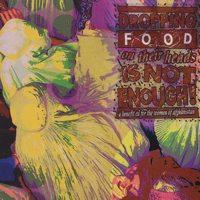Geykido Comet always puts out good compilations. With eight released in the last couple years alone -- each bursting at the seams with a healthy variety of established and underground punk acts and unreleased material -- that much should be expected by now. What's especially great about this compilation is that like its title might indicate, the beneficiaries are the women of Afghanistan whose rights and livelihood have been ravaged by a decade of Taliban rule and an ongoing war in their homeland.
The Revolutionary Association for the Women of Afghanistan (RAWA) was founded in 1977 to oppose the oppression of both the Soviet Union and the Jihadists, rejecting all forms of religious fundamentalism. As a result of its dissident stance, its founder Meena Keshwar Kamal was assassinated in 1987. But the movement has lived on, and in the post-9/11 Afghanistan of today, its focus has widened, as the group set up programs for orphaned children and continued humanitarian and women's rights campaigns.
In the spirit of empowering women and equality, Dropping Food draws equally on some of punk's best female and male voices. And several of the bands, like the Devil Is Electric (featuring Chris Clavin and Hannah Jones of Ghost Mice), along with crust-punkers Iowaska (neither Iowan, nor ska, if you were wondering) manage both at once. The Bouncing Souls with "That Song" and Pistol Grip with "Crucifixion Politix" provide some of the comp's best sing-alongs, while Intro5pect's spastic electro-punk thrives on its unique instrumentation on "Conditioned Reaction." Berkeley supergroup the Frisk provide the in-your-face "In My Nightmare" alongside the re-incarnation of fellow Bay Area ska-punks Link 80, whose rendition of "Time for Change" suggests something far removed from the band Nick Traina once fronted.
From the infectious pop-punk of Randy's "Karl Marx and History" to crust punks like Armistice and Resist & Exist beside old-schoolers Youth Brigade, Dropping Bombs is enough to cover the bases of just about every subgenre. The Revolutionary Women of Afghanistan even provide a couple great tracks of rousing traditional Central Asian music that, oddly enough, seem to fit right in. After 31 songs, the collection closes with Jello Biafra's trademark spoken word that wraps it all up, giving a not-so-subtle reminder of why projects like this are necessary.
With a whopping 50 percent of proceeds going straight to RAWA and a track listing that nearly everyone can enjoy, this is a compilation that will benefit the listener just as much as it will its worthy recipient.
